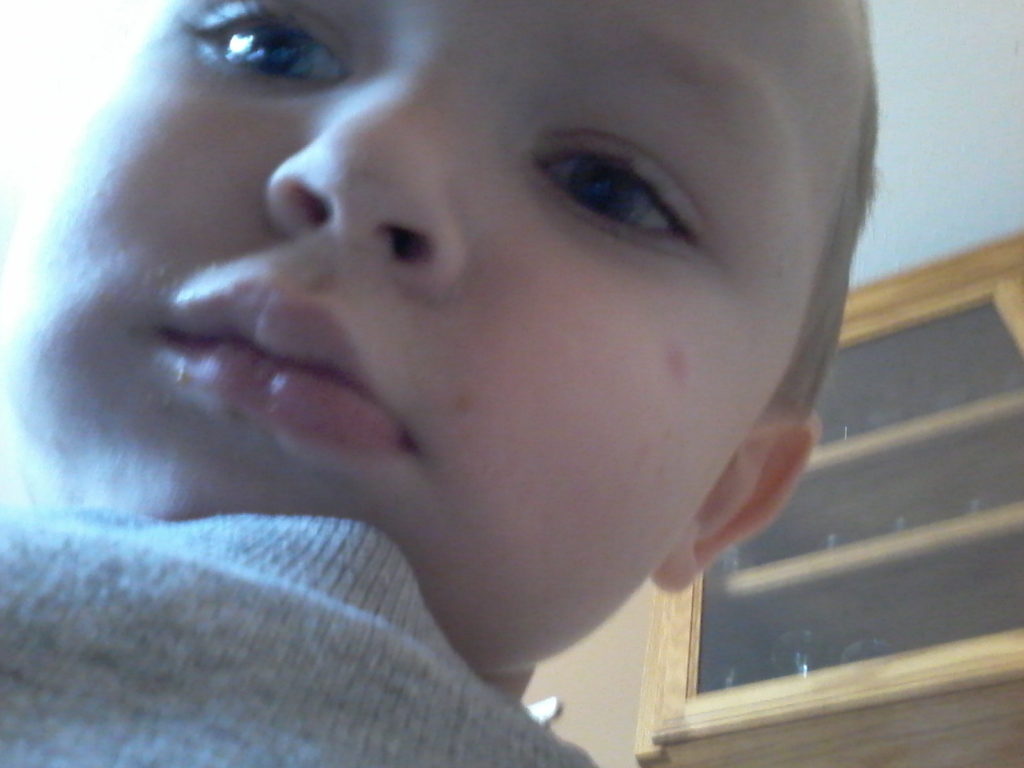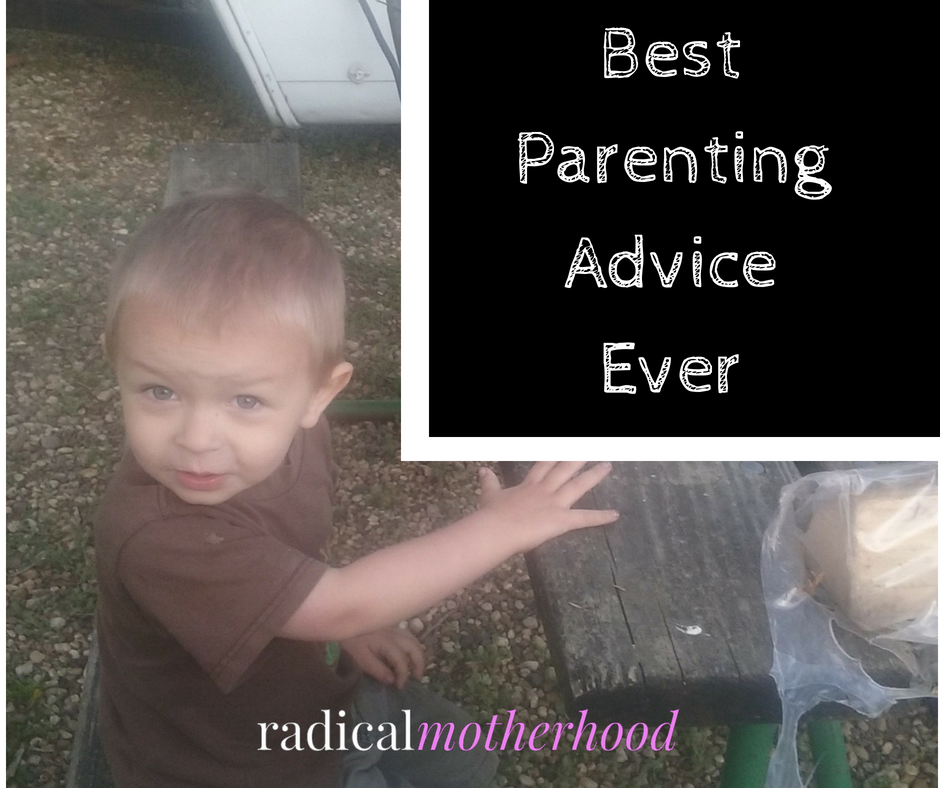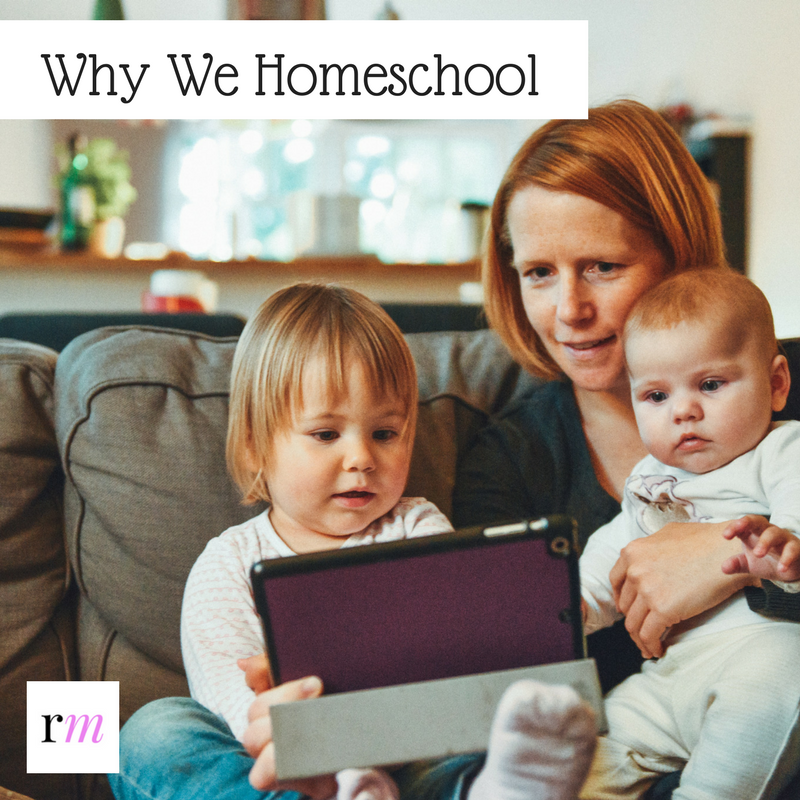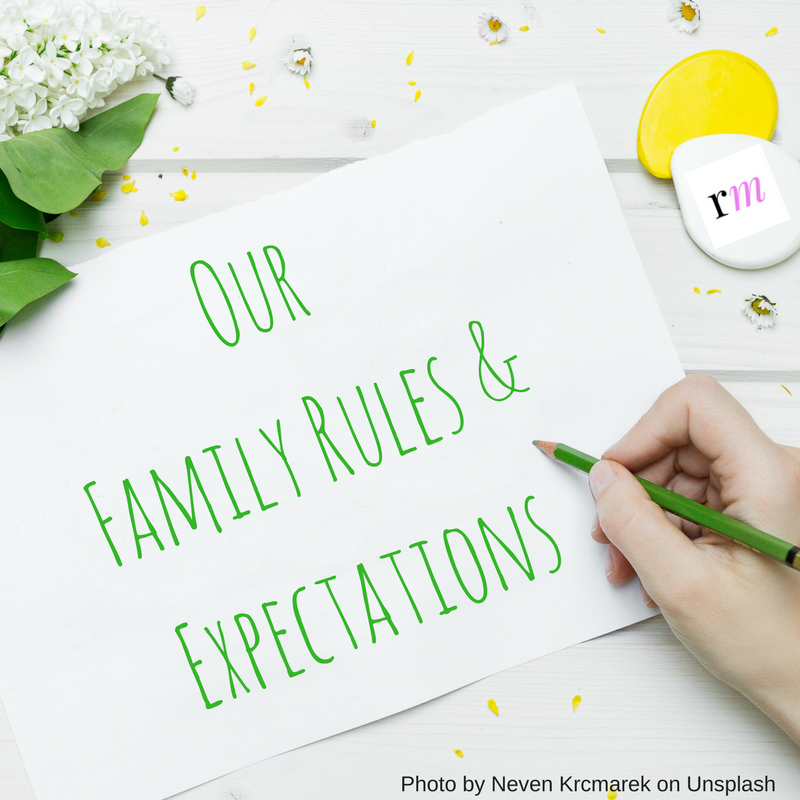Diapers in Kindergarten
It would probably surprise my stepmom to know that there is a piece of parenting wisdom she shared with me years ago that I call to mind almost every day. Well, that fact might not surprise her (she’s got a lot of golden parenting nuggets stored away), but I bet she’d never guess WHICH piece of wisdom it is that I think about so often. Here it is…
I was struggling to potty train one of my boys, at age 2 or so, and in response to my despair and frustration, she said,
Well, he’s not going to go to kindergarten in diapers.
Let that sink in for a minute. It’s a lot more profound than it first seems.
Are you with me? This is about more than just diapers, people. This is DEEP.
It looks like just an offhand comment with no greater purpose than to make me feel better, doesn’t it? Well, it’s not. Let me explain why this is the BEST PARENTING ADVICE EVER GIVEN:
In this particular situation, what she meant is that when it’s important TO MY SON to not be in diapers anymore (because how embarrassing would it be to be the only kid in class wearing diapers?), he will figure out the whole toilet thing on his own. I backed off on the potty training (potty bribing, more accurately), and by the second week of his 3-year-old preschool class, he was out of diapers. Not only did he do what I wanted him to do, but I didn’t have to do any begging or threatening or sitting in the living room all day feeding him juice boxes on the potty chair to get him there. Thanks to his grandma (and the preschool class of 2007), he did not, in fact, go to kindergarten in diapers.
I have found, over the years, that not only is this advice useful in thinking about potty training, but it pretty much applies to every situation in which I’m trying to get my kids to learn something that they aren’t ready for or think is stupid/pointless/boring. Sure enough, every single time, when the child is motivated, they learn whatever it is I was agonizing over seemingly overnight, with little or no help from me. Or they don’t learn it and choose to face the consequences instead (a powerful learning experience in itself). Either way, letting go of my urge to control them and get them on MY timeline pays off for both of us. I can save my time and energy (and vocal chords) for something else, and they learn how to set – and achieve – their own goals.
Case in point:
I have an almost-3-year-old named Stephen. He is adorable, sweet, smart, and obsessed with motor vehicles (mainly police cars and bulldozers). He greets me every morning with a slow-motion “Hiiiii Moooom” and a smile and a big, leg-squeezing hug. He counts the basement stairs and his dad’s fingers, and he knows all the letters in the word “police”. He also loves peanut butter, play dough, LEGOs, peeling the wrappers off crayons, and hanging out all day in his pajamas. And YouTube, although I like to pretend that we’re too busy doing enriching and educational activities (and then journaling about them in our sketchbooks – don’t you want to be that kind of family?) to waste our time on electronics.
Stevie gets a hold of the camera:
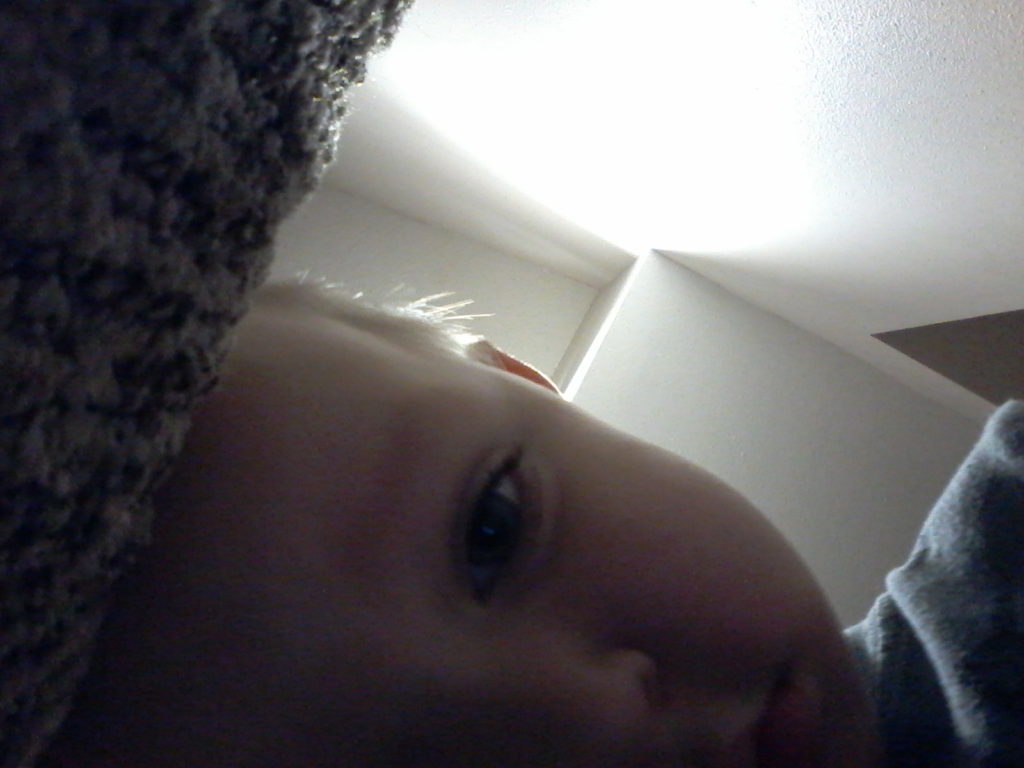
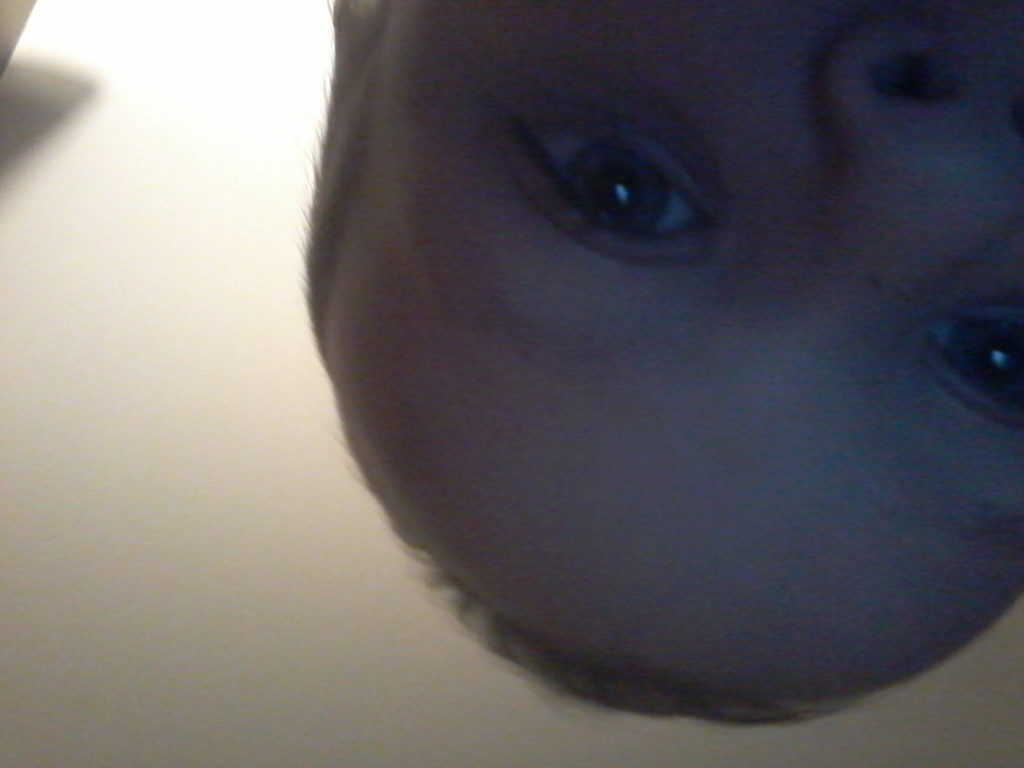
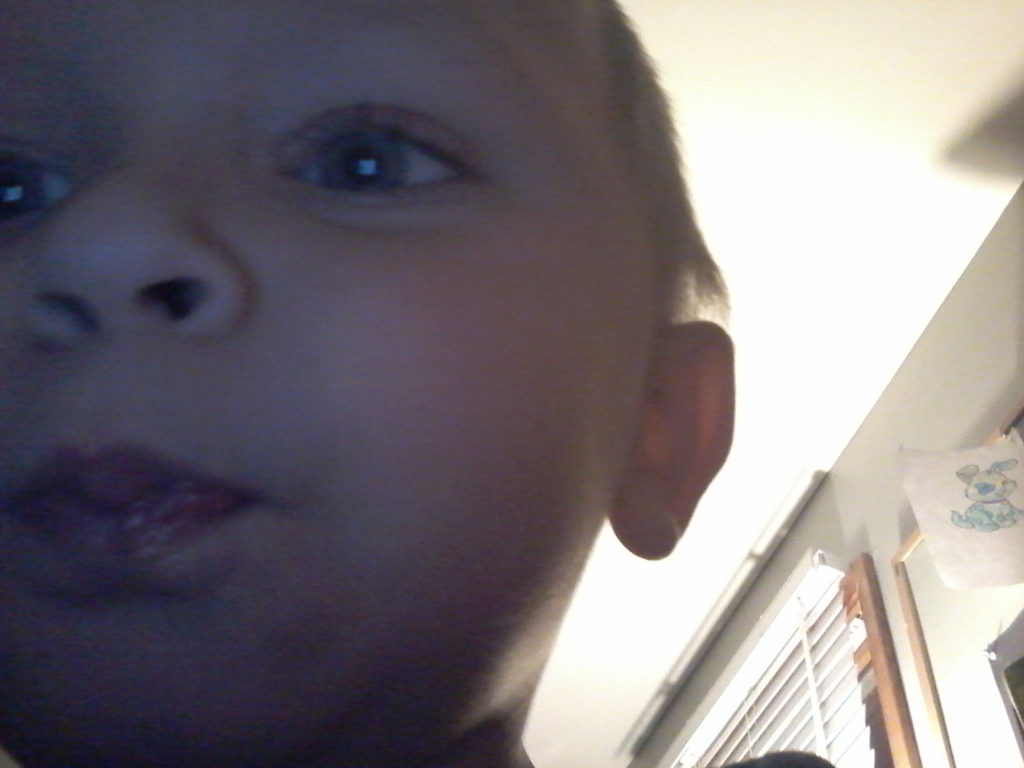
Up until two months ago, John and I were concerned about Stephen’s speech development. Because there was no speech development. He said two words: uh-oh (is that even a word?) and bye-bye. None of my kids were early talkers, and several of them didn’t say much until they were three, but I don’t remember them saying SO little for SO long. Finally, I decided that we needed to get some kind of expert involved, so we went to our family doctor. She recommended that we call the AEA (Area Educational Agency: http://www.heartlandaea.org/) and have him evaluated, which we did. The VERY NEXT DAY after the evaluation, before anyone started giving him any kind of speech therapy, he started saying words. Lots of words. All of a sudden, within a week, he was saying all of his colors, numbers up to ten, and a bunch of other words, like “car” and “pancake”.
Phil and Stevie taking a pretend nap:
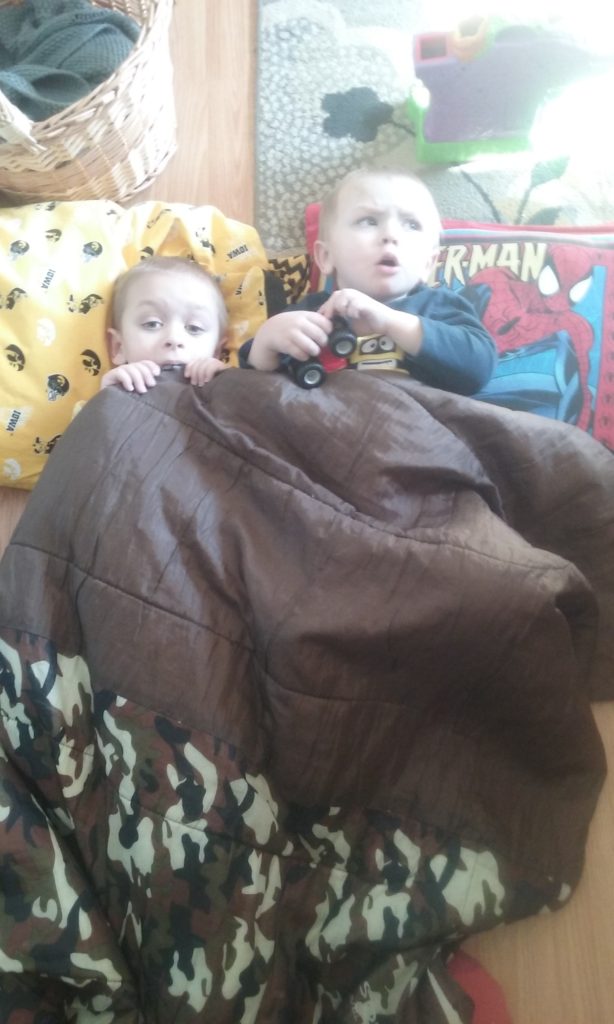
Now, a couple of months later, he’s putting words together, like “blue car” and “my truck.” I seriously think he understood the AEA visit and thought that he should probably start talking to get us off his case about it. Which brings me to the point of this whole post: as parents, especially homeschooling parents, we tend to think that it’s our job to take information and skills and cram them into our children’s brains, according to OUR schedule (or one we found on the internet). Our job, we think, is to gather all the workbooks, worksheets, enrichment activities, and tests, and administer them, and then our children will know and apply all of that information forever after in their daily lives. The more we cram into them, the better off they’ll be. Left to their own devices (like Stephen with his speech development), they would never learn anything of value, eventually becoming leeches on society and draining us of all our money and energy in our old age. I know I’m not the only parent who has two different visions of her child’s future – one in which he’s an astronaut heart surgeon; another in which he spends 20 hours a day in the basement eating Oreos and trying to master Call of Duty. Surely, without our constant intervention, they’ll choose the latter. Right?
Real life experience has taught me that kids actually learn best when they’re in control of what they learn and how and when they learn it. They fiercely resist being taught, and the mere act of trying to teach something tends to kill their interest in that particular thing.
Camping. A great way to learn things. And get really dirty.
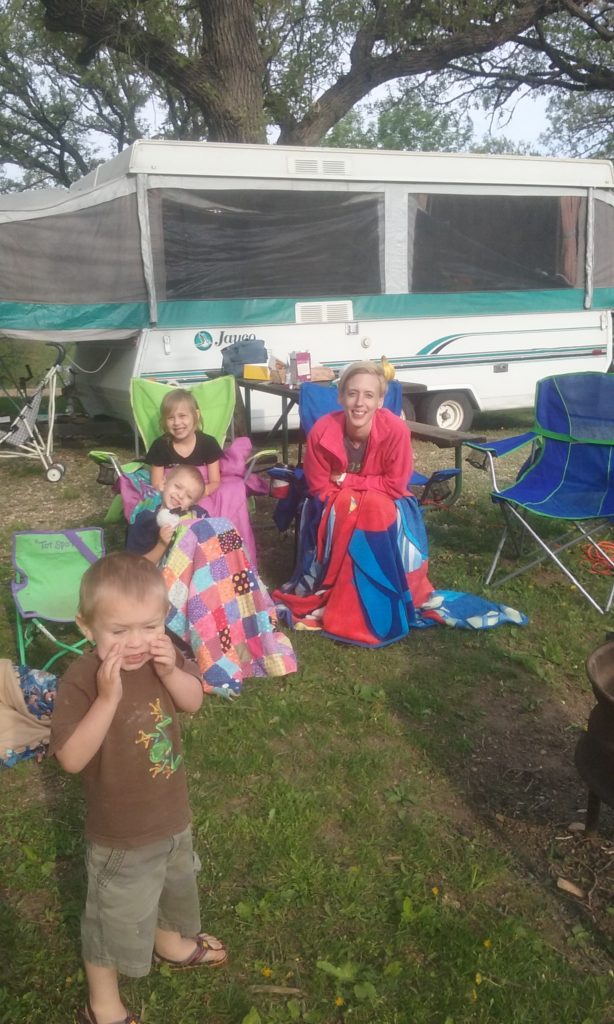
Here’s what Stevie, and my other kids, have taught me about the way they learn:
- You can’t make someone learn. The student has total control over whether they actually learn something, because learning happens in THEIR brain. The sooner you accept this (especially you, homeschool moms), the better your relationship with your kids will be. What they learn, and how much/how well/how fast they learn, is on THEM, not you. You are not a better teacher because your kids learn more quickly and easily than others. You are not a failure because someone else’s four-year-old can read and yours can’t. Let your children take credit for their academic successes and be accountable for their failures.
- Kids learn best when you let them decide when they’re ready for a certain subject or skill. I tried to teach Esme to read twice. The first time, she was totally bored by it and made so little progress in 3 months that we gave up. We tried again 6 months later and she practically taught herself. She is now in 5th grade and, according to some weird test the school gives, reading at an 11th grade level. The timeline our American schools are on is totally arbitrary and not scientifically related to how a child’s brain develops. Go at your own pace and don’t freak out if other 5th graders know who Marie Curie is or how to do long division and yours doesn’t.
- If a person – of any age – is not interested in a particular topic, they are probably not going to learn much about it, no matter how much information you give them or how many worksheets they complete. It will stick in their brain long enough to pass the test or finish the workbook, and then it will be gone. And slime recipes and video game hacks and jokes about poop will reclaim that corner of the brain.
- Learning happens best in real life situations. Baking actual bread is better at teaching math than a worksheet about baking bread. Going on a nature hike is better than reading about local wildlife in a textbook. Watching you help an elderly person get their groceries out of the cart is better than reading a story about being helpful.
- We have to stop obsessing about preparing kids for the next step. Much of the logic I hear from school people goes like this: Kids need to do X now so they’re ready to do X next year. If you think like that, where does it stop? When I was in school, preschool was optional and left to the discretion of parents. We basically started school at age 5 in kindergarten, and we didn’t learn how to read until first grade. Now, 2 and 3-year-old preschool is the norm, and if you don’t know all the letters and their sounds by kindergarten, plus a bunch of sight words, you’re behind. Let your kids (and yourself) enjoy the stage they’re at and stop worrying about what comes next. Focus on right now, and the future will take care of itself. If you’re always thinking about the future, you miss out on all the potential of the present, and life starts to feel like a very long, unsatisfying waiting game.
- Kids are interested in things that their parents are not. If you give kids control over what they learn and how they learn it (even just a little bit of control), you will be annoyed and frustrated by their choices. They might spend an entire year reading books about elephants, and nothing but elephants. They might spend all day either talking about or playing a video game that makes absolutely no sense to you. You might have fantastic memories of your mom reading you a certain book as a child, but your kids run from the room every time you try to read it to them. They are not you. They are not blank slates or lumps of clay. They are people, and they have unique interests, personalities, and dispositions that will not always (or even usually) jive with yours. Accept that. Embrace it! Stop trying to turn them into your vision of the perfect human, because you are not God, and God already has a (better) plan for them than you do.
- You can kill a child’s curiosity. If you constantly bombard a child with information and force them to “learn” what you want them to, they will stop trying to learn on their own. For one thing, they don’t have time to pursue their own interests. For another, most kids want to get along and go with the flow. They will figure out what the adults want from them and follow the path of least resistance, so they will do the worksheets and study for the tests and try to make the teacher happy. And we teachers are generally not happy when kids interrupt us with a bunch of questions that aren’t in the textbook, or make suggestions about what topic to study next.
- You can also kill a child’s natural interest in something by trying to turn it into an educational experience. My older boys were really into Minecraft when we were homeschooling them. So, when I found a Minecraft homeschool program online, I thought I had hit the homeschooling jackpot. I can teach the boys math, reading, and history using Minecraft? Sign us up! Well, they were excited about it until they realized that they had to build what the school told them to, on the school’s timeline. There may have even been quizzes and writing assignments. Not only did we eventually drop out of the program, they never enjoyed playing Minecraft again.
My basic point is this: the more you can leave your kids alone to discover their own interests and learn what they want, how they want, the better.
Maybe you’re brave (some would say foolish, I say brave) enough to watch from a distance, giving them help only when asked. Maybe you teach just a few subjects and let them handle the rest. Or maybe your kids are in school, but this post gives you a new perspective on how much value you place on straight A’s and perfect attendance and making the teacher happy. Maybe you take a few non-school-sponsored field trips throughout the schoolyear or work on an art project at home together while the teacher’s assigned busywork sits undone.
Be radical.
Remember, they probably won’t go to kindergarten in diapers.
Heck, maybe they won’t go to kindergarten at all.
And, if you see my stepmom, tell her thank you.
